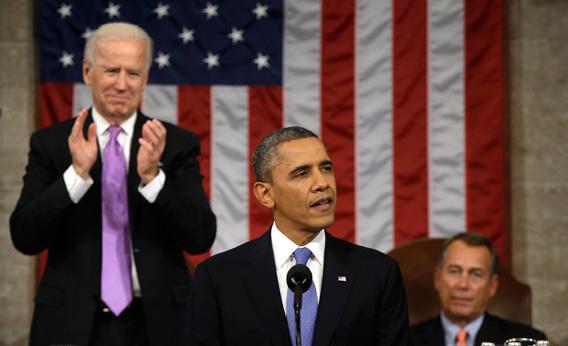Barack Obama campaigned and won re-election without anything much resembling a second-term agenda. On the campaign trail, he called for greater tax fairness, more jobs, and doing something or other about immigration. Seeking refuge in even greater vagueness, Mitt Romney was in no position to call him out.
Since the election, however, the president has been steadily filling in the missing pieces, asserting his renewed mandate on behalf of an ambitious, liberal agenda. As of last night’s State of the Union address, no one can accuse Obama of lacking specifics. His proposals were many, detailed, and in a few instances unexpected. His speech was a deliberate effort to move the national conversation away from an endless budget battle that threatens to overshadow his second term. Looking beyond what he was right to call the “manufactured” fiscal crisis that continues to preoccupy Washington, Obama offered a new program that was broader and more comprehensive than his first term’s.
This includes the night’s biggest surprise, a proposed hike in the minimum wage of nearly 25 percent, to $9 an hour, which would lift millions of workers out of poverty. The speech also proposed major new investments in infrastructure and early childhood education, a path to citizenship for illegal immigrants, marriage equality for homosexuals, voting reform, gun control, a U.S.-EU free-trade zone, comprehensive tax reform, market-based rules on greenhouse gas emissions, national energy conservation goals, more research into clean energy technology, an accelerated troop drawdown in Afghanistan, and more.
Most of this won’t even come up for a vote, of course. While a few Republicans have signaled flexibility on immigration, the current House leadership is unlikely to take up a minimum-wage law or new spending programs. Obama knows that and has incorporated the reality of obstructionism into his political strategy. His big speech set what he hopes will become a lose-lose trap for Republican legislators: accede to his agenda, or face his mobilized supporters in 2014. In his first term, Obama’s message to the GOP was, “I will meet you halfway.” They refused to budge. His second term message is: “Compromise or pay the political price.”
To the public, the implicit message was: “If you want any of this stuff, I’m going to need a Democratic Congress next time.” When Republicans won control of Congress in 1994, Bill Clinton responded with a long list of small-bore initiatives: gun safety locks, school uniforms, the v-chip, cellphones for citizen patrols, and so forth. Clinton wanted to show that he was still relevant and that he could still accomplish something even with a divided government. Obama, by contrast, has little appetite for legislative hors d’oeuvres. His program is designed to show not what he can do with a Republican Congress but what he can’t do with one.
The impossibility of getting much done at present lends itself to expansiveness, at least at the level of presidential rhetoric. Talking about what he would like to do, rather than what he can do, Obama is able to offer a broad agenda around the themes of equality and fairness that framed his second inaugural. At the same time, the president must avoid the charge that he is relapsing into old-school liberalism. Thus he framed his proposals on Tuesday evening as “smarter government” rather than bigger or more government.
This framing is telling. Where Obama may be overreaching is in assuming away fiscal problems that are still very much with us. The American economy is in recovery mode and tax receipts are rising, but a vast structural deficit remains. Absent the kind of grand bargain Republicans are loath even to discuss, federal insolvency will pre-empt the kinds of investments Obama talked about last night. To the delight of his base, the president has found his progressive voice. Only in a context of fiscal rectitude can he use it to bring back government activism.
A slightly different version of the piece appears in the Financial Times.
